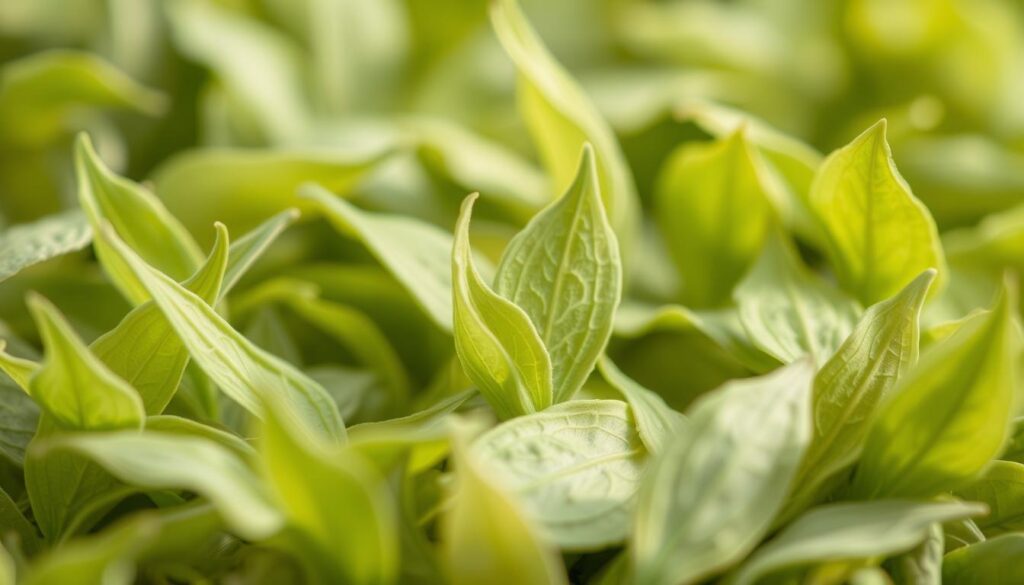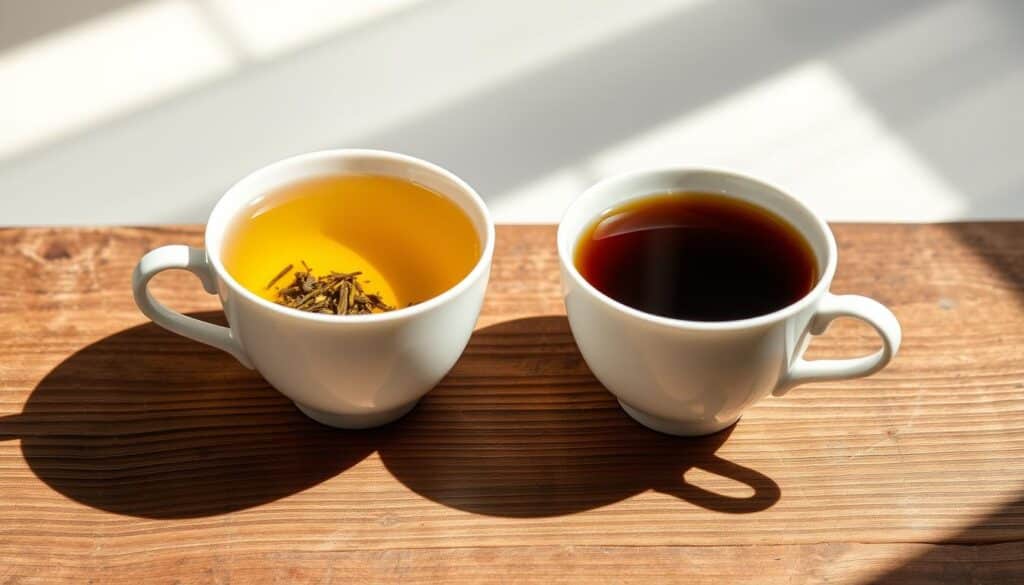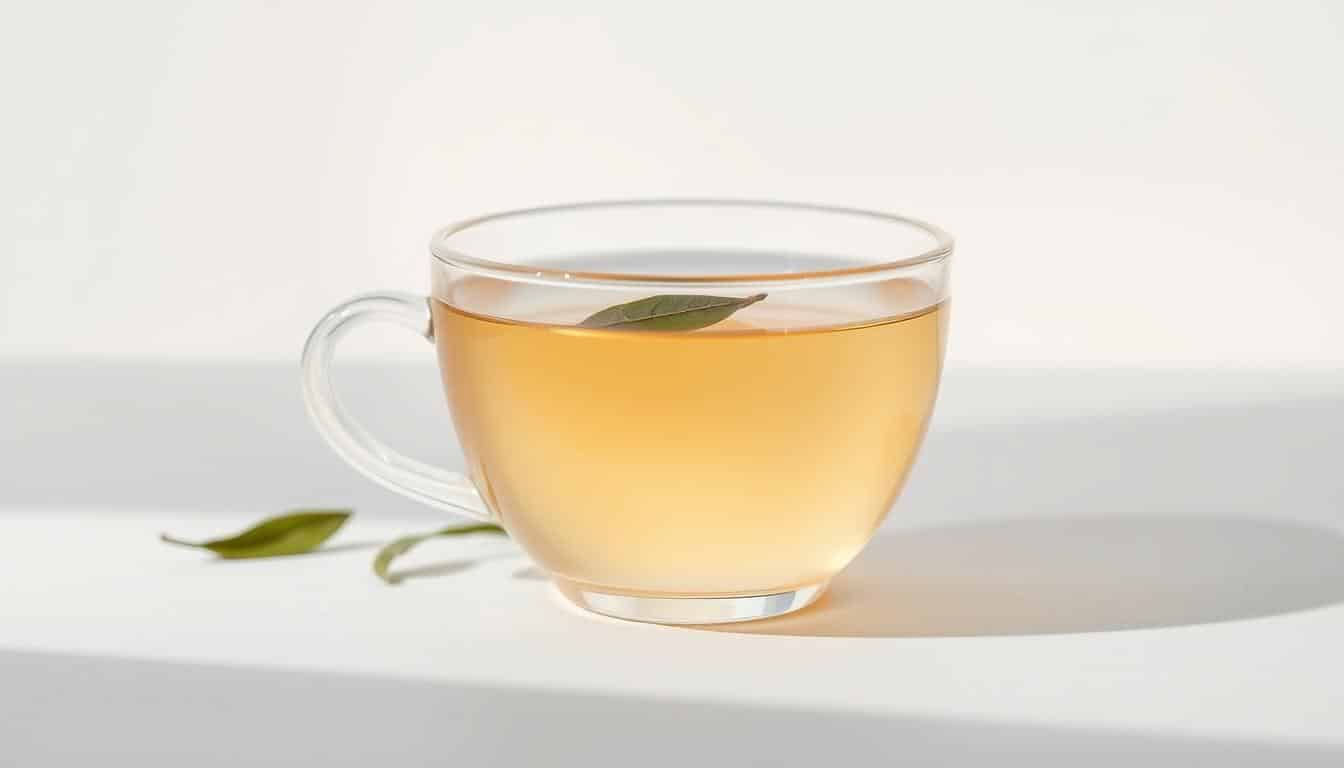Did you know a cup of white tea has less than half the caffeine of coffee? This fact surprises many, but not tea lovers. White tea is known for its mild taste and delicate smell. It’s often overlooked in the world of caffeinated drinks.
Drinking organic white tea can change your day. It’s a calm choice in a world where coffee is king. Learning about white tea’s caffeine shows it’s a great choice for your tea collection.
White tea has a long history and is now a wellness favorite. Finding the best white tea brands can make your tea time special. This guide will help you understand white tea’s caffeine and how to make the perfect cup.
Key Takeaways
- White tea has less caffeine than coffee and most teas.
- Its unique taste makes it special for tea lovers.
- The caffeine in white tea changes with its type and how it’s made.
- Picking organic white tea means a clean, pure drink.
- Adding white tea to your diet can help you relax and be mindful.
Understanding White Tea and Its Unique Characteristics
White tea is a special gem in the tea world. It offers a gentle yet profound experience. This tea is not just tasty but also comes from ancient traditions and rich cultures.
The Origins and Varieties of White Tea
White tea comes from China, especially Fujian province. It has been grown there for centuries. The most famous types are Silver Needle, White Peony, and Shou Mei.
Silver Needle is made from young buds. It tastes delicate and sweet. White Peony has leaves and buds for a fuller taste. Shou Mei is bolder and earthier.
Each type of white tea is special. They are loved by tea lovers all over the world.
Processing Methods: What Makes White Tea Different?
White tea is unique because it’s processed very little. It only goes through withering and drying. This keeps its natural goodness and health benefits.
White tea is often sun-dried. This keeps its delicate taste and lots of antioxidants. The drying process lets the tea’s flavors and nutrients shine.
White tea has many types and is made carefully. It’s a great choice for those who love wellness. It’s soothing and healthy.
To learn more about white and black tea, check out this comparison: White Tea vs Black Tea. It helps you understand the differences and how to use them in your wellness journey.
Caffeine Content in White Tea: Separating Myth from Reality
Myths about caffeine content in white tea are like mist around the leaves. White tea is known for its gentle flavors. But, it has more caffeine than you might think. The caffeine in white tea can be as much as in green or black tea, depending on the leaves and when they were picked.
You might think lighter tea means less caffeine. But, the truth about white tea caffeine content is more complex. The amount of caffeine depends on when the tea leaves were picked and what part of the plant they are from. Young leaves and early spring tea have more caffeine to fight off bugs.
Does one cup of white tea wake you up like coffee? It has less caffeine than coffee but can be as energizing as some green teas. Knowing this lets us enjoy our tea more, understanding its caffeine adds to its refreshing quality.
Even though some think white tea has little caffeine, knowing the facts makes it more special. Tea is all about discovery and enjoying every sip. It’s not just about taste but also about being present in the moment.
Health Benefits of White Tea Beyond Caffeine
White tea is a gentle yet potent remedy in the world of wellness beverages. Its low caffeine content is appealing. But, the array of *white tea health benefits* goes far beyond just stimulating alertness. Let’s explore some of these remarkable health-enhancing properties.
Rich in Antioxidants
White tea is a powerhouse of *antioxidants*. These agents fight aging and boost wellness. With a high level of catechins, white tea protects against oxidative stress and cellular damage.

Supports Weight Loss
If shedding a few pounds is on your wellness checklist, white tea can help. Its components boost metabolism subtly yet effectively. It’s a celebrated beverage in the natural weight loss community.
Incorporating white tea into your daily routine can support your weight loss ambitions. It’s a delightful method to help you reach your goals.
Heart Health and Anti-Inflammatory Properties
Beyond its serene demeanor, *white tea* touches the heart—quite literally. It supports cardiovascular health with impressive anti-inflammatory properties and arterial relaxation. This makes the heart thrive amidst peaceful sips.
This blend of white tea health benefits ensures every cup contributes to long-term wellbeing. It’s not just for momentary relaxation.
In integrating white tea into our wellness practices, we unlock a treasure trove of health benefits. The antioxidants in white tea act as vigilant guardians. Its weight loss support and heart health enhancements ensure a holistic upliftment of our well-being.
White Tea vs Black Tea: A Comparison of Caffeine and Benefits
I often think about the big question: white tea vs black tea. Both have special qualities and caffeine levels. Let’s explore what makes them different.

Caffeine Levels: White Tea vs Black Tea
Looking at caffeine comparison, white tea has less caffeine than black tea. This is because of how they’re made. White tea is barely processed, while black tea is fermented a lot. This makes black tea taste stronger and have more caffeine. Knowing this can help you choose what’s right for you, especially if you watch your caffeine intake.
Health Benefits: Which Tea is Healthier?
White tea is known for its antioxidants, which are good for your skin and immune system. It might even help prevent some diseases. Black tea, on the other hand, is great for your heart and digestion. So, picking between white tea vs black tea depends on what you want to improve in your health.
Here’s a quick comparison:
| Aspect | White Tea | Black Tea |
|---|---|---|
| Caffeine Level | Low to moderate | High |
| Antioxidants | High | Moderate |
| Processing | Minimal | Extensive |
| Health Benefits | Strong antioxidant, skin health, immunity | Heart health, digestive support |
Choosing between white tea and black tea is a fun journey. Both have special things to offer. By learning about them, we can pick the best tea for our daily routines.
Conclusion
Exploring white tea shows it’s more than just a tasty drink. It’s packed with wellness benefits. We’ve seen how it helps with weight loss and heart health.
White tea has less caffeine than black tea but still offers many health perks. Its gentle taste and health benefits make it a great choice for those looking for calm and energy.
In wrapping up, white tea is more than a drink. It’s a way to live a healthier, more mindful life. By enjoying white tea, we embrace a tradition of wellness and health. Let’s cherish each sip, celebrating our health and mindful living.


